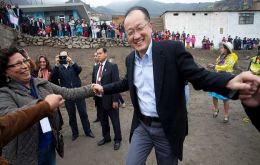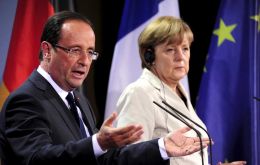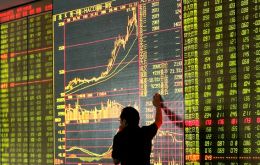MercoPress. South Atlantic News Agency
Economy
-
Wednesday, July 3rd 2013 - 04:43 UTC
Brazil's Rousseff pushes political reform to quell discontent

President Dilma Rousseff sent Congress reform proposals on Tuesday intended to make Brazilian politics more representative in a bid to recoup popularity she lost in a wave of angry protests against the country's political establishment.
-
Wednesday, July 3rd 2013 - 04:26 UTC
World Bank President Jim Yong Kim returns to Peru, praises social development

World Bank President Jim Yong Kim is in Peru this week, returning to the place where he says his interest in poverty reduction was first piqued.
-
Wednesday, July 3rd 2013 - 04:08 UTC
Give Us Your Real Dollars for Our Fake Dollars: Argentina Credit

President Cristina Fernandez de Kirchner’s wish of being able to print dollars is coming true as the central bank begins issuing dollar-denominated certificates today that trade in pesos.
-
Tuesday, July 2nd 2013 - 18:50 UTC
Falkland Islands Tourist Board Manager talks past successes and future plans

AT the end of his first year directing the Falkland Islands Tourist Board, Managing Director Tony Mason shares the past year's accomplishments and a vision for the future.
-
Friday, June 28th 2013 - 07:37 UTC
Aditya Birla Group has the largest business turnover among Indian companies in Latin

Aditya Birla Group is a late entrant to Latin America and came very much later than the Tatas and Reliance, the other big iconic Indian business groups. However Birla has made up for lost time by emerging as the Indian company with the largest annual business turnover in Latin America, which was around 1.8 billion dollars last year. Birla is also the largest investor from the Indian private sector in Latin America.
-
Thursday, June 27th 2013 - 05:14 UTC
London cabs with publicity inviting to visit and enjoy Uruguay

Sights of the Atlantic beaches from the hills surrounding the Uruguayan coast can be admired while travelling to Piccadilly Circus or to Westminster Palace in any one of the 75 London cabs with publicity contracted by Uruguay’s Ministry of Tourism began on the 17th June.
-
Thursday, June 27th 2013 - 04:56 UTC
France confirms recession and budget deficit above EU 3% ceiling

The weak state of the French economy and uncertain outlook for budget targets was in focus on Wednesday after official data confirmed that the country is in recession. Weak growth and public finances in France are of acute concern to the European Commission and to Germany which is the main powerhouse in the Euro zone.
The figures are also watched closely on nervous financial markets. -
Tuesday, June 25th 2013 - 19:49 UTC
Chinese stocks tumble as Beijing announces an end to the era of cheap credit

Chinese stocks touched a four-and-a-half-year low on Tuesday amid persistent concerns over the government's credit-tightening policy. The Shanghai Composite SSE index fell as much as 5.8% at one point, before a late rally meant it ended down 0.3%.
-
Tuesday, June 25th 2013 - 18:39 UTC
Repsol to consider YPF compensation offer, including stake in shale deposits

Spanish oil corporation Repsol's board is scheduled to consider on Wednesday a non-cash compensation offer from Argentina over the seizure of its majority stake in energy firm YPF, according to the Spanish government news agency EFE.
-
Tuesday, June 25th 2013 - 18:34 UTC
Paraguay poised to become fastest growing economy this year, 13%

Paraguay's economy expanded 14.8% in the first quarter compared with the same period last year, driven mainly by farming, cattle-ranching and construction activity, the central bank said. GDP surged 8.8% in the first quarter versus the fourth quarter of 2012.
